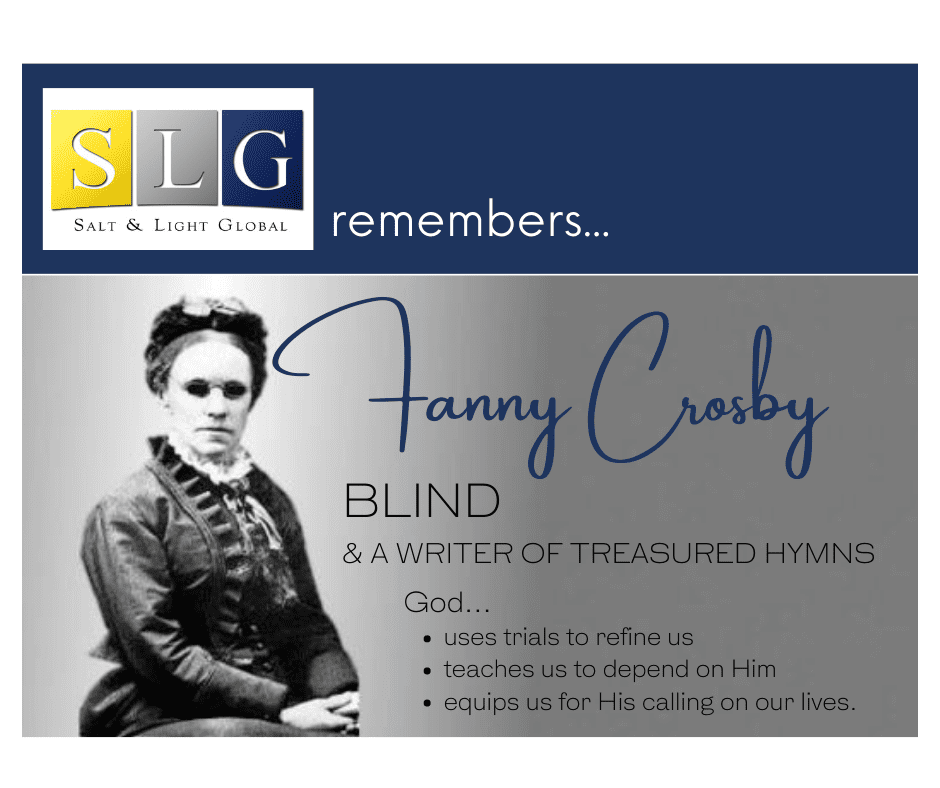
“For thus says the One who is high and lifted up, who inhabits eternity, whose name is Holy: “I dwell in the high and holy place, and also with him who is of a contrite and lowly spirit, to revive the spirit of the lowly, and to revive the heart of the contrite.’” ~ Isaiah 57:15
Fanny Crosby’s Story of Dependence on God | 1820-1915
Widely regarded as “the most prolific and significant writer of gospel songs in American History,” Fanny Crosby authored beloved hymns including, “Blessed Assurance,” “Near the Cross,” “Redeemed,” “Saved by Grace,” “Tell Me the Story of Jesus,” and “To God be the Glory.” What most people don’t know about Fanny Crosby is that she was blind from infancy.
Her story is a beautiful example of how God uses trials to refine us, to teach us to depend on Him, and to equip us for the calling He has placed on our lives.
Fanny lost her sight when she was only a few months old and spent the rest of her life blind. Her father died when she was 1 year old, and her mother, just 21, worked multiple jobs to provide for the family. Fanny’s grandparents raised her until age 5, because her mother’s work schedule only allowed her to visit on Sundays. However, God used her grandparents to teach her the love of God and cultivate her talent for words and music. Most of all, they taught her to find joy, even in the midst of tribulation, and to trust God.
“Whatever your affliction is, you can bear it cheerfully. That’s because (God is) using it to lead you to something even better.” ~ Grandmother Eunice Crosby
When Fanny was 5, her mother moved the family far away from Fanny’s grandparents for a better job. However, being a single working mother of a blind child in the 1800s was not easy, and to ensure that Fanny had proper care, Fanny was placed in an orphanage for several years.
At age 15, God used the kindness of strangers to transform Fanny’s life. She-received a scholarship to attend the New York Institute for the Blind, where she later became a teacher of grammar, rhetoric, and history. Even before the invention and widespread use of Brail, Fanny taught her students that a blind person could accomplish almost everything a sighted person could, and she lived her life as proof of this assertion. It was also during this time that Fanny came to know Christ the way her Grandmother Crosby did.
At age 27, Fanny was invited to a revival service by a friend. Fanny described the moment of her conversion like this, “My very soul was flooded with celestial light. For the first time I realized that I had been trying to hold the world in one hand, and the Lord in the other.”
At age 38, Fanny married a fellow blind teacher, Alexander Van Alstine. In their first year of marriage, they had a daughter who tragically died in her sleep. The couple grieved and leaned on the Lord even more to see them through.
At age 45, Fanny began writing hymns at the urging of a famous hymn-writer and publisher named William Bradbury. She penned more than 8,000 songs in the next 51 years of her life, over 2,000 of which were published. Hymnals containing her work sold over 100 million copies. At her peak, she composed 6-7 hymns per day, and her husband, a talented organist, often composed music to accompany her lyrics.
Her hymns were highly influential in shaping the character and culture of the young American nation. In the aftermath of the civil war and the economic depressions and societal divisions that followed, many of the hymns authored by Fanny helped people find the light and hope of Christ. Fanny carried her gospel melodies all over; she sang and played at President Grant’s funeral, spoke before Congress several times, performed for many sitting US Presidents, and carried the gospel to college campuses, including Harvard.
However, Fanny’s devotion to serving the Lord extended far beyond her musical talents. She was devoted to sharing the love of Christ in any way possible. Paid an average of $2 per hymn, she modestly supported herself and gave the rest of her earnings to care for the poor and “least of these.” She worked tirelessly as a missionary to the urban poor of New York City and regularly visited Bowery Mission, where she touched millions with the hope of the Gospel throughout her life. If she wasn’t busy writing, she was working in churches and missions, nursing the sick and caring for the poor.
Lessons from Fanny’s Life:
Fanny Crosby’s story is a beautiful example of how God uses trials to refine us, to teach us to depend on Him, and to equip us for the calling He has placed on our lives. Her life and testimony also remind us that there is no half-way in following the Lord, nor can we coast along on the coat-tails of generations who came before us. Each of us needs to know Christ personally and accept Him as Lord and Savior of our own life. While God’s good plan for her was evident throughout her life, only when Fanny truly surrendered to the Lord did she start walking in the fullness of His abundant favor and purpose for her life. Fanny Crosby’s life also teaches us something important about God: He is faithful always. Fanny depended on the Lord, and she saw first hand that His faithfulness is unfailing. As Fanny herself said, “God will answer your prayers better than you think. Of course, one will not always get exactly what he has asked for….We all have sorrows and disappointments, but one must never forget that, if commended to God, they will issue in good….His own solution is far better than any we could conceive.”
Fanny Crosby in Her Own Words:
“It is not enough to have a song on your lips. You must also have a song in your heart.”
“Rescue the perishing, care for the dying, Snatch them in pity from sin and the grave; Weep o’er the erring one, lift up the fallen; Tell them of Jesus the mighty to save.”
“God will answer your prayers better than you think. Of course, one will not always get exactly what he has asked for….We all have sorrows and disappointments, but one must never forget that, if commended to God, they will issue in good….His own solution is far better than any we could conceive.”
“Take the wold, but give me Jesus;
In His cross my trust shall be,
Till, with clearer, brighter vision
Face to face my Lord I see.”
“It seemed intended by the blessed providence of God that I should be blind all my life, and I thank him for the dispensation. If perfect earthly sight were offered me tomorrow I would not accept it. I might not have sung hymns to the praise of God if I had been distracted by the beautiful and interesting things about me.”
“Sometimes I need to reject the music proposed for my songs because the musicians misunderstand that the Fanny Crosby who once wrote for the people in the saloons has merely changed the lyrics. Oh my no. The church must never sing its songs to the melodies of the world.”
“One of the easiest resolves that I formed in my young and joyous heart was to leave all care to yesterday and to believe that the morning would bring forth its own peculiar joy.”
Sources:
Character for Life, by Don Hawkinson; pgs 34-38
https://livingbydesign.org/fanny-crosby-on-faith-7-quotes-in-7-days/









